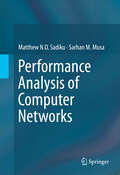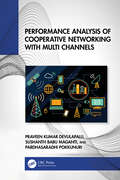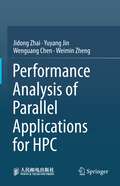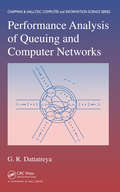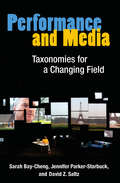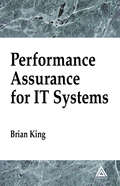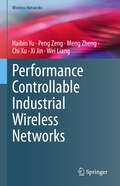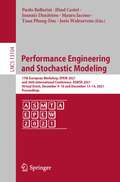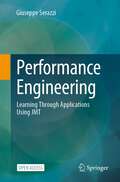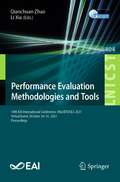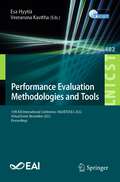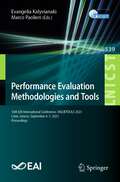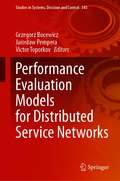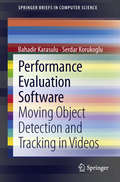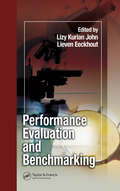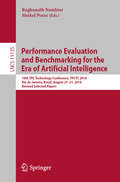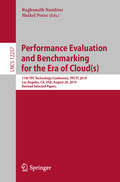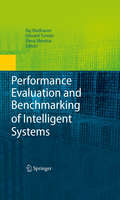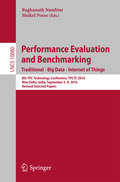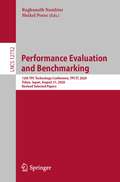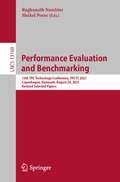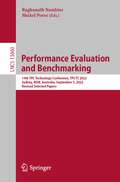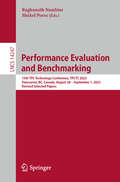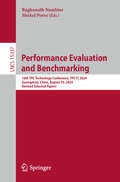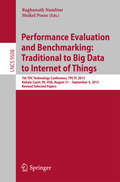- Table View
- List View
Performance Analysis of Computer Networks
by Matthew N.O. Sadiku Sarhan M. MusaThis book covers performance analysis of computer networks, and begins by providing the necessary background in probability theory, random variables, and stochastic processes. Queuing theory and simulation are introduced as the major tools analysts have access to. It presents performance analysis on local, metropolitan, and wide area networks, as well as on wireless networks. It concludes with a brief introduction to self-similarity. Designed for a one-semester course for senior-year undergraduates and graduate engineering students, it may also serve as a fingertip reference for engineers developing communication networks, managers involved in systems planning, and researchers and instructors of computer communication networks.
Performance Analysis of Cooperative Networking with Multi Channels
by Praveen Kumar Devulapalli Sushanth Babu Maganti Pardhasaradhi PokkunuriThis book covers wireless cooperative communication and advanced communication techniques for research scholars and post-graduate students.Features:• This book will be the reference book for cooperative communication.• It addresses the problems in small-scale cooperative communication.• It presents cooperative routing algorithms for large-scale cooperative networks with the constraint of throughput and transmission time.• It presents energy- efficient transmission approach by making use of multiple radio terminals.• It presents adaptive routing algorithm for large-scale cooperative network under mobility environment.
Performance Analysis of Parallel Applications for HPC
by Wenguang Chen Jidong Zhai Weimin Zheng Yuyang JinThis book presents a hybrid static-dynamic approach for efficient performance analysis of parallel applications on HPC systems. Performance analysis is essential to finding performance bottlenecks and understanding the performance behaviors of parallel applications on HPC systems. However, current performance analysis techniques usually incur significant overhead. Our book introduces a series of approaches for lightweight performance analysis.We combine static and dynamic analysis to reduce the overhead of performance analysis. Based on this hybrid static-dynamic approach, we then propose several innovative techniques for various performance analysis scenarios, including communication analysis, memory analysis, noise analysis, computation analysis, and scalability analysis. Through these specific performance analysis techniques, we convey to readers the idea of using static analysis to support dynamic analysis.To gain the most from the book, readers should have a basic grasp of parallel computing, computer architecture, and compilation techniques.
Performance Analysis of Queuing and Computer Networks (Chapman & Hall/CRC Computer and Information Science Series)
by G.R. DattatreyaPerformance Analysis of Queuing and Computer Networks develops simple models and analytical methods from first principles to evaluate performance metrics of various configurations of computer systems and networks. It presents many concepts and results of probability theory and stochastic processes.After an introduction to queues in compu
Performance And Media: Taxonomies For A Changing Field
by David Z. Saltz Sarah Bay-Cheng Jennifer Parker-StarbuckThis timely collaboration by three prominent scholars of media-based performance presents a new model for understanding and analyzing theater and performance created and experienced where time-based, live events, and mediated technologies converge-particularly those works conceived and performed explicitly within the context of contemporary digital culture. Performance and Media introduces readers to the complexity of new media-based performances and how best to understand and contextualize the work. Each author presents a different model for how best to approach this work, while inviting readers to develop their own critical frameworks, i. e. , taxonomies, to analyze both past and emerging performances. Performance and Media capitalizes on the advantages of digital media and online collaborations, while simultaneously creating a responsive and integrated resource for research, scholarship, and teaching. Unlike other monographs or edited collections, this book presents the concept of multiple taxonomies as a model for criticism in a dynamic and rapidly changing field.
Performance Assurance for IT Systems
by Brian KingPerformance Assurance for IT Systems emphasizes the importance of addressing performance and technology-related issues from the beginning of the planning process, at the feasibility and bid stages. It promotes the concept of Performance Assurance throughout the entire system lifecycle, covering technology, relevant processes, and people-related top
Performance Controllable Industrial Wireless Networks (Wireless Networks)
by Haibin Yu Wei Liang Xi Jin Chi Xu Peng Zeng Meng ZhengWith the rapid proliferation of information and communications technology, industrial automation has undergone a sweeping transformation toward intelligent manufacturing. Wireless communication is widely considered to be one of the key technologies enabling intelligent manufacturing. On one hand, deterministic communication with high reliability and low latency is typically required in industrial automation applications. On the other hand, wireless communication in industrial settings is hindered by strictly limited communication resources and many other factors which mainly derive from the shared and error-prone nature of the wireless channels used. The limited communication resources and harsh channel conditions pose considerable challenges for reliable, real-time data transmission in industrial wireless networks. Resource optimization methods are vital to ensuring the deterministic performance of industrial wireless networks. Traditional resource optimization methods adopt the isolated resource optimization methods for each protocol layer, which is inherently local-optimal and leads performance uncontrollable. To focus on “Performance Controllable Industrial Wireless Networks”, this book presents thejoint resource optimization methods across multiple protocol layers for industrial wireless networks; reviews recent, major advances; and discusses the practical implementations of the proposed methods. The joint resource optimization methods discussed here will greatly benefit scientists and researchers in the areas of industrial automation and Industrial Internet of Things. To gain the most from this book, readers should have a fundamental grasp of wireless communication, scheduling theory, and convex optimization.
Performance Engineering and Stochastic Modeling: 17th European Workshop, EPEW 2021, and 26th International Conference, ASMTA 2021, Virtual Event, December 9–10 and December 13–14, 2021, Proceedings (Lecture Notes in Computer Science #13104)
by Tuan Phung-Duc Paolo Ballarini Mauro Iacono Hind Castel Ioannis Dimitriou Joris WalraevensThis book constitutes the refereed proceedings of the 17th European Workshop on Computer Performance Engineering, EPEW 2021, and the 26th International Conference, on Analytical and Stochastic Modelling Techniques and Applications, ASMTA 2021, held in December 2021. The conference was held virtually due to COVID 19 pandemic. The 29 papers presented in this volume were carefully reviewed and selected from 39 submissions. The papers presented at the workshop reflect the diversity of modern performance evaluation, with topics ranging from modeling and analysis of network/control protocols and high performance/big data information systems, analysis of scheduling, blockchain technology, analytical modeling and simulation of computer and network systems.
Performance Engineering: Learning Through Applications Using JMT
by Giuseppe SerazziThis open access book improves the users' skills needed to implement models for performance evaluation of digital infrastructures. Building a model is usually a relatively easy task, but making it an accurate representation of the phenomenon to be reproduced is a completely different matter. It is well-known that to increase the ability to build reliable models it is necessary to accumulate experience. The book addresses this need by presenting a collection of case studies of increasing complexity. Readers are introduced to the modeling process gradually, learning the basic concepts step-by-step as they go through the case studies. Queueing Networks are used to design the models solved with simulation and analytical techniques from the open source Java Modelling Tools (JMT). Among the models analyzed there are systems for optimizing performance, identifying bottlenecks, evaluating the impact of the variability of traffic and service demands, analyzing the effects of synchronization policies in parallel computing. Four case studies derived from real-life scenarios are also presented: a surveillance system, autoscaling load fluctuations, web app workflow simulation, and crowd computing platform. This book serves as a reference tool for graduate and senior-level computer science students in courses of performance evaluation and modeling, as well as for researchers and practitioners.
Performance Evaluation Methodologies and Tools: 14th EAI International Conference, VALUETOOLS 2021, Virtual Event, October 30–31, 2021, Proceedings (Lecture Notes of the Institute for Computer Sciences, Social Informatics and Telecommunications Engineering #404)
by Qianchuan Zhao Li XiaThis book constitutes the refereed conference proceedings of the 14th International Conference on Performance Evaluation Methodologies and Tools, VALUETOOLS 2021, held in October 2021. Due to the safety concerns and travel restrictions caused by COVID-19, VALUETOOLS took place online in a live stream. VALUETOOLS 2021 aims to provide a world-leading and multidisciplinary venue for researchers and practitioners in diverse disciplines such as computer science, networks and telecommunications, operations research, optimization, control theory and manufacturing. The 16 full papers were carefully reviewed and selected from 32 submissions and focus on methodologies and practices in modelling, performance evaluation and optimization of complex systems.
Performance Evaluation Methodologies and Tools: 15th EAI International Conference, VALUETOOLS 2022, Virtual Event, November 2022, Proceedings (Lecture Notes of the Institute for Computer Sciences, Social Informatics and Telecommunications Engineering #482)
by Esa Hyytiä Veeraruna KavithaThis book constitutes the refereed conference proceedings of the 15th International Conference on Performance Evaluation Methodologies and Tools, VALUETOOLS 2022, held in November 2022. Due to the safety concerns and travel restrictions caused by COVID-19, VALUETOOLS 2022 took place online in a live stream. The conference provides a world-leading and multidisciplinary venue for researchers and practitioners in diverse disciplines such as computer science, networks and telecommunications, operations research, optimization, control theory and manufacturing. The 18 full papers were carefully reviewed and selected from 47 submissions and are grouped in thematically as following: game theory; queueing models; applications; retrial queues; performance analysis and networking; distributed computing.
Performance Evaluation Methodologies and Tools: 16th EAI International Conference, VALUETOOLS 2023, Crete, Greece, September 6–7, 2023, Proceedings (Lecture Notes of the Institute for Computer Sciences, Social Informatics and Telecommunications Engineering #539)
by Evangelia Kalyvianaki Marco PaolieriThis volume contains the proceedings of the 16th EAI International Conference on Performance Evaluation Methodologies and Tools, VALUETOOLS 2023, which took place in Heraklion, Crete during September 6-7, 2023. The conference brought together researchers, developers, and practitioners from around the world and from different communities including computer science, networks and telecommunications, operations research, optimization, control theory, and manufacturing. The 27 members of the International Program Committee (PC) helped to provide at least 3 reviews for each of the 30 submitted contributions. Based on the reviews and PC discussions, 11 high-quality papers (9 research papers, 1 tool paper, and 1 work-in-progress paper) were accepted to be presented during the conference. The volume includes contributions organized into four thematic sessions: Games and Optimization; Simulation; Networking and Queues; Tools.
Performance Evaluation Models for Distributed Service Networks (Studies in Systems, Decision and Control #343)
by Grzegorz Bocewicz Jarosław Pempera Victor ToporkovThis book presents novel approaches to formulate, analyze, and solve problems in the area of distributed service networks, notably based on AI-related methods (parallel/cloud computing, declarative modeling, fuzzy methods). Distributed service networks are an important area of research and applications. The methods presented are meant to integrate both emerging and existing concepts and approaches for different types of production flows through synchronizations. An integration of logistics services (e.g., supply chains and projects portfolios), public and multimodal transport, traffic flow congestion management in ad hoc networks, design of high-performance cloud data centers, and milk-run distribution networks are shown as illustrations for the methods proposed. The book is of interest to researchers and practitioners in computer science, operations management, production control, and related fields.
Performance Evaluation Software
by Serdar Korukoglu Bahadir KarasuluPerformance Evaluation Software: Moving Object Detection and Tracking in Videos introduces a software approach for the real-time evaluation and performance comparison of the methods specializing in moving object detection and/or tracking (D&T) in video processing. Digital video content analysis is an important item for multimedia content-based indexing (MCBI), content-based video retrieval (CBVR) and visual surveillance systems. There are some frequently-used generic algorithms for video object D&T in the literature, such as Background Subtraction (BS), Continuously Adaptive Mean-shift (CMS), Optical Flow (OF), etc. An important problem for performance evaluation is the absence of any stable and flexible software for comparison of different algorithms. In this frame, we have designed and implemented the software for comparing and evaluating the well-known video object D&T algorithms on the same platform. This software is able to compare them with the same metrics in real-time and on the same platform. It also works as an automatic and/or semi-automatic test environment in real-time, which uses the image and video processing essentials, e.g. morphological operations and filters, and ground-truth (GT) XML data files, charting/plotting capabilities, etc. Along with the comprehensive literature survey of the abovementioned video object D&T algorithms, this book also covers the technical details of our performance benchmark software as well as a case study on people D&T for the functionality of the software.
Performance Evaluation and Benchmarking
by Lizy Kurian John Lieven EeckhoutComputer and microprocessor architectures are advancing at an astounding pace. However, increasing demands on performance coupled with a wide variety of specialized operating environments act to slow this pace by complicating the performance evaluation process. Carefully balancing efficiency and accuracy is key to avoid slowdowns, and such a balance can be achieved with an in-depth understanding of the available evaluation methodologies. Performance Evaluation and Benchmarking outlines a variety of evaluation methods and benchmark suites, considering their strengths, weaknesses, and when each is appropriate to use.Following a general overview of important performance analysis techniques, the book surveys contemporary benchmark suites for specific areas, such as Java, embedded systems, CPUs, and Web servers. Subsequent chapters explain how to choose appropriate averages for reporting metrics and provide a detailed treatment of statistical methods, including a summary of statistics, how to apply statistical sampling for simulation, how to apply SimPoint, and a comprehensive overview of statistical simulation. The discussion then turns to benchmark subsetting methodologies and the fundamentals of analytical modeling, including queuing models and Petri nets. Three chapters devoted to hardware performance counters conclude the book.Supplying abundant illustrations, examples, and case studies, Performance Evaluation and Benchmarking offers a firm foundation in evaluation methods along with up-to-date techniques that are necessary to develop next-generation architectures.
Performance Evaluation and Benchmarking for the Era of Artificial Intelligence: 10th TPC Technology Conference, TPCTC 2018, Rio de Janeiro, Brazil, August 27–31, 2018, Revised Selected Papers (Lecture Notes in Computer Science #11135)
by Meikel Poess Raghunath NambiarThis book constitutes the thoroughly refereed post-conference proceedings of the 10th TPC Technology Conference on Performance Evaluation and Benchmarking, TPCTC 2018, held in conjunction with the 44th International Conference on Very Large Databases (VLDB 2018) in August 2018.The 10 papers presented were carefully reviewed and selected from numerous submissions.The TPC encourages researchers and industry experts to present and debate novel ideas and methodologies in performance evaluation, measurement, and characterization.
Performance Evaluation and Benchmarking for the Era of Cloud: 11th TPC Technology Conference, TPCTC 2019, Los Angeles, CA, USA, August 26, 2019, Revised Selected Papers (Lecture Notes in Computer Science #12257)
by Meikel Poess Raghunath NambiarThis book constitutes the refereed post-conference proceedings of the 11th TPC Technology Conference on Performance Evaluation and Benchmarking, TPCTC 2019, held in conjunction with the 45th International Conference on Very Large Databases (VLDB 2019) in August 2019.The 11 papers presented were carefully reviewed and focus on topics such as blockchain; big data and analytics; complex event processing; database Optimizations; data Integration; disaster tolerance and recovery; artificial Intelligence; emerging storage technologies (NVMe, 3D XPoint Memory etc.); hybrid workloads; energy and space efficiency; in-memory databases; internet of things; virtualization; enhancements to TPC workloads; lessons learned in practice using TPC workloads; collection and interpretation of performance data in public cloud environments.
Performance Evaluation and Benchmarking of Intelligent Systems
by Raj Madhavan Elena Messina Edward TunstelThis contributed volume is dedicated to the subject of performance evaluation and benchmarking of intelligent systems by drawing from the experiences and insights of experts gained both through theoretical development and practical implementation of intelligent systems in a variety of application domains. The chapters cover a range of applications, such as assistive robotics, planetary surveying, urban search and rescue, and line tracking for automotive assembly. Subsystems include human-robot interaction, multi-robot coordination, communications, perception, and mapping, Chapters also cover simulation support and open source software for cognitive platforms, providing examples of enabling underlying technologies that can help intelligent systems to propagate and increase in capabilities. Performance Evaluation and Benchmarking of Intelligent Systems serves as a professional reference for researchers and practitioners in a variety of fields.
Performance Evaluation and Benchmarking. Traditional - Big Data - Internet of Things
by Meikel Poess Raghunath NambiarThis book constitutes the thoroughly refereed post-conference proceedings of the 8th TPC Technology Conference, on Performance Evaluation and Benchmarking, TPCTC 2016, held in conjunction with the 41st International Conference on Very Large Databases (VLDB 2016) in New Delhi, India, in September 2016. The 9 papers presented were carefully reviewed and selected from 20 submissions. They reflect the rapid pace at which industry experts and researchers develop innovative techniques for evaluation, measurement and characterization of complex systems.
Performance Evaluation and Benchmarking: 12th TPC Technology Conference, TPCTC 2020, Tokyo, Japan, August 31, 2020, Revised Selected Papers (Lecture Notes in Computer Science #12752)
by Meikel Poess Raghunath NambiarThis book constitutes the refereed post-conference proceedings of the 12th TPC Technology Conference on Performance Evaluation and Benchmarking, TPCTC 2020, held in August 2020.The 8 papers presented were carefully reviewed and cover the following topics: testing ACID compliance in the LDBC social network benchmark; experimental performance evaluation of stream processing engines made easy; revisiting issues in benchmarking metric selection; performance evaluation for digital transformation; experimental comparison of relational and NoSQL document systems; a framework for supporting repetition and evaluation in the process of cloud-based DBMS performance benchmarking; benchmarking AI inference; a domain independent benchmark evolution model for the transaction processing performance council.
Performance Evaluation and Benchmarking: 13th TPC Technology Conference, TPCTC 2021, Copenhagen, Denmark, August 20, 2021, Revised Selected Papers (Lecture Notes in Computer Science #13169)
by Meikel Poess Raghunath NambiarThis book constitutes the refereed post-conference proceedings of the 13th TPC Technology Conference on Performance Evaluation and Benchmarking, TPCTC 2021, held in August 2021. The 9 papers presented were carefully reviewed and selected from numerous submissions. The TPC encourages researchers and industry experts to present and debate novel ideas and methodologies in performance evaluation, measurement, and characterization.
Performance Evaluation and Benchmarking: 14th TPC Technology Conference, TPCTC 2022, Sydney, NSW, Australia, September 5, 2022, Revised Selected Papers (Lecture Notes in Computer Science #13860)
by Meikel Poess Raghunath NambiarThis book constitutes the refereed post-conference proceedings the 14th TPC Technology Conference on Performance Evaluation and Benchmarking, TPCTC 2022, which was held in Sydney, NSW, Australia, on September 5, 2022.The 5 revised full papers presented were carefully selected from 12 submissions. The conference focuses on Pick and Mix Isolation Levels; Benchmarking considerations for Trustworthy and Responsible AI (Panel); Preliminary Scaling Characterization with TPCx-AI and New Initiatives.
Performance Evaluation and Benchmarking: 15th TPC Technology Conference, TPCTC 2023, Vancouver, BC, Canada, August 28 – September 1, 2023, Revised Selected Papers (Lecture Notes in Computer Science #14247)
by Meikel Poess Raghunath NambiarThis book constitutes the refereed post-conference proceedings from the 15th TPC Technology Conference on Performance Evaluation and Benchmarking, TPCTC 2023, held in Vancouver, British Columbia, Canada, during August 28 – September 1, 2023. The 9 full papers included in this book were carefully reviewed and selected from 17 submissions. These papers focus on various novel ideas and methodologies for Performance evaluation and Benchmarking in emerging technology areas.
Performance Evaluation and Benchmarking: 16th TPC Technology Conference, TPCTC 2024, Guangzhou, China, August 30, 2024, Revised Selected Papers (Lecture Notes in Computer Science #15337)
by Meikel Poess Raghunath NambiarThis book constitutes the refereed proceedings of the 16th TPC Technology Conference on Performance Evaluation and Benchmarking, TPCTC 2024, held in Guangzhou, China, during August 30, 2024. The 7 full papers included in this book were carefully reviewed and selected from 12 submissions. The proceedings also include one invited talk and one paper based on a panel discussion with industry and academic leaders. The book focusses on providing vendors with a valuable tool to showcase the performance competitiveness of their current offerings while also aiding in the enhancement and tracking of products still in development.
Performance Evaluation and Benchmarking: Traditional to Big Data to Internet of Things
by Meikel Poess Raghunath NambiarThis book constitutes the thoroughly refereedpost-conference proceedings of the 7th TPC Technology Conference on PerformanceEvaluation and Benchmarking, TPSTC 2015, held in conjunction with the 40thInternational Conference on Very Large Databases (VLDB 2015) in Kohala Coast,Hawaii, USA, in August/September 2015. The 8 papers presented together with 1 keynote,and 1 vision paper were carefully reviewed and selected from 24 submissions. Many buyers use TPC benchmark results as points of comparison when purchasingnew computing systems. The information technology landscape is evolving at arapid pace, challenging industry experts and researchers to develop innovativetechniques for evaluation, measurement and characterization of complex systems. The TPC remains committed to developing new benchmark standards to keep pace,and one vehicle for achieving this objective is the sponsorship of theTechnology Conference on Performance Evaluation and Benchmarking (TPCTC).
